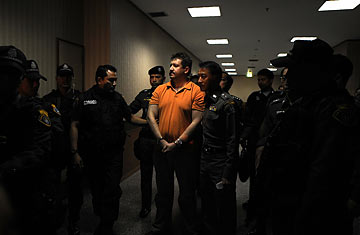
Thai commandos escort Russian arms dealer Viktor Bout, center, known as the "Merchant of Death" for his role arming rebels from Africa to South America, after a press conference at the Thai police headquarters in Bangkok on March 7, 2008.
(2 of 2)
Beyond FARC, the underlying fear is that of al-Qaeda funding new strikes against the U.S. with drug profits. But "the assertion that al-Qaeda is big time into narcotics simply has never been borne out by the facts," says Glenn Carle, a former CIA officer and deputy national intelligence officer for transnational threats during the Bush Administration. Carle says the Taliban and Hizballah, the militant Lebanese political organization that is on the U.S. terrorist list, both have varied records forming alliances with narcotraffickers, but says drug profits play a supporting, rather than primary, role in funding terrorist operations. For Carle the DEA stings represent "proof of a clever American government operation to capture people engaged in the drug trade. That's a good thing, but is has nothing to do with terrorism necessarily."
The DEA does have one case that may fit the narcoterrorism thesis. In an indictment announced two weeks ago, federal prosecutors allege that Lebanese and Turkish suspects acknowledged a connection to Hizballah while attempting to acquire a laundry list of weapons (from Beretta handguns to surface-to-air missiles) from DEA informants.
While the government has secured a series of plea deals and convictions in these cases, not all investigations have been successful. In one case in 2009, an alleged trafficker with the alias Pablo Juan Sanchez was taken to New York to face charges of trafficking drugs to West Africa. Unable to prove a drug-trafficking case, according to Sanchez's attorney Todd Merer, the government dropped the charges and the defendant pleaded to a minor count for possessing a small quantity of cocaine. Merer later defended another DEA target from Ghana, who was acquitted as part of conspiracy to ship cocaine through Liberia.
The arrests and prosecutions do not come cheap. Among the expenses the government has incurred in these investigations is compensation for informants. One DEA informant, Patrick "Paddy" McKay, a former pilot with the South African mercenary company Executive Outcomes said he has received $450,000 from the government since 2005. "When I first saw these cases, I found it hard to believe that all these resources were being expended," Merer says.
Similarly, cooperation can be rewarding for nations partnering with DEA investigations. In one investigation, the stepson of Liberia's President Ellen Johnson Sirleaf wore a wire for the DEA while meeting with suspected drug traffickers. Liberia's narcotics- and law-enforcement-assistance package from the State Department has jumped from $800,000 in 2007 to a requested $17 million for 2011, a more than 2,000% increase.
With the trials of Viktor Bout, Jamal Yousef and other narcoterrorism suspects on the horizon, Manhattan judges and juries will weigh in on the U.S.'s role as a global law enforcer and whether the interests of national security and justice can be served at the same time. "The U.S. does have an interest in proactively investigating those beyond its borders who have the will and the capability to do harm to the U.S. That's what the folks at SOD and the prosecutors at the Southern District of New York have been trying to do," says Boyd Johnson, the Deputy U.S. attorney who oversees the office's international terrorism and narcotics unit.
For the DEA, counterterrorism will remain a necessary function of the drug war. "The DEA's focus is drug trafficking and we are not going looking for terrorists, that's not our job," says Maltz. "Our job is to make sure that we are recognizing the connections between drugs and terrorism, and we're going to do the best that we can."
